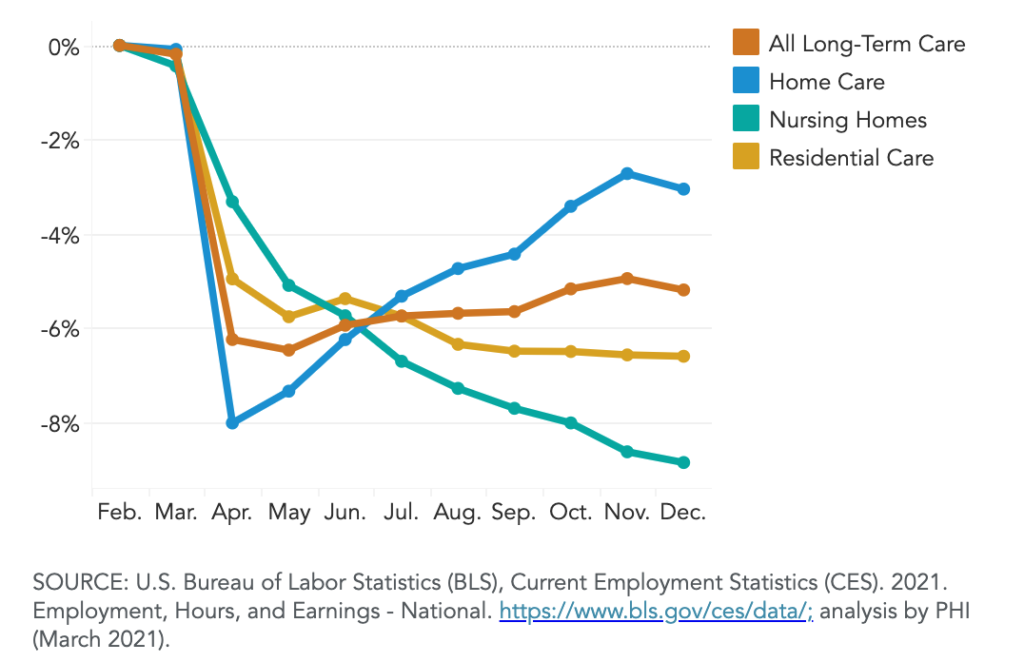With the pandemic affecting the way that doctors, nurses and medical companies treat those in need, home care is becoming increasingly more common with each passing year. Let’s break down specifically what home nursing care is, the kind of services it provides and the tools you can use to add this service to your business.
With the pandemic affecting the way that doctors, nurses, and medical companies treat those in need, home care is becoming increasingly more common with each passing year. Let’s break down specifically what home nursing care is, the kind of services it provides, and the tools you can use to add this service to your business.
If you’re reading this, you already know how important it is to provide top-quality, affordable care for those who need it the most.
After all, many senior citizens with severe LTSS needs (Long Term Service and Support) struggle to afford up to 2 years of paid senior home care without some kind of financial assistance.
Whether you’re already running an in-home nursing care business, or considering expanding your services, it’s important to know about the various types of home care that you could offer at an affordable price.
Thankfully, you’ve come to the right place. Let’s break down exactly what home nursing care is, the various types that might appeal to you and the tools you need to get your home care business up and running.
What Is Home Nursing Care (In General)?
Coming up with a home care definition can be tricky as it’s a pretty broad term. In short, it is a wide range of health care services that can be provided for anyone with specific needs – ranging from physical and mental to emotional and more.
The following people primarily benefit from home care:
- People with chronic illnesses
- People with injuries/medical setbacks that prevent them from living safely in their home
- People who are retired or aging and require assistance to live independently
- People with disabilities
- People with special needs
Home health care has proven to be a less expensive and more convenient alternative to healthcare in a medical facility, like a hospital or a skilled nursing facility.
Nurse care at home can be provided on both a short-term or long-term basis depending on the client’s needs and typical home caregivers include nurses, therapists and aides.
And with two-thirds of nursing homes believing that they wouldn’t stay open in 2021 due to increased COVID costs, the need for various types of home health services is greater than ever.
You might be interested in reading our review of the best nursing home management software that will help you manage your nursing business
Different Types Of Home Care
Services that home care businesses provide vary depending on the client’s needs. But generally, home care can provide the following benefits:
- Keeping clients safe in their own home
- Assistance with everyday activities such as dressing, bathing, feeding and catering, etc.
- Companionship, socializing
- Physical, mental and emotional therapy or rehabilitation
- Short/long-term at home nursing care

And there are plenty of typical services that are worth considering specializing in when setting up a home care business.
Popular Home Care Services
What Is In-Home Nursing Care?
One of the most common kinds of home care is specifically in-home nursing care. In this case, nurses provide a wide range of cost-efficient services for patients, depending on their own personal needs, from the convenience of their own homes.
After a client has been diagnosed, a home health nurse will consult with a doctor to create a care plan to achieve specific goals.
In home nursing care is intended mainly for clients who are well enough to be discharged from hospital, but are still in need of a nurse to perform preventative, therapeutic and/or rehabilitative services.
Nursing care at home can be short-term, long-term, shift schedule-based, hourly, daily or weekly.
Home Nursing Care Services Business Owners Should Consider
Manage Your Home Nursing Care Business Digitally
A digital solution can help make running a home nursing care business much easier.
As a business owner or home care service manager, you need an easy way to dispatch nurses/caregivers to the different patients’ homes, and cater to their specific needs.
The truth though is that it can be extremely difficult juggling various responsibilities such as tracking nurses’ hours, scheduling nurses’ shifts, maintaining compliance at all times, and communicating efficiently.
With an all-in-one software solution that’s also HIPAA compliant, like Connecteam, you can perform all of these tasks from the convenience of your desktop and mobile device (depending on the task).

You, the manager, can benefit from a digital solution in the following ways:
- Use an employee time clock app to accurately track your nurses’ work hours and ensure they arrive at the right homes on time with geofence and breadcrumbs technology.
- Maintain compliance with a daily inspection checklist app, easy medication risk assessment forms, incident reports, equipment visual checks, and more.
- Use an employee communication app to send important updates to your nurses, provide engaging posts, easily message all staff members through a 1:1 or group chat and easily search for any staff member using an employee directory.
Manage Your Home Nursing Care Business From One Place
Connecteam’s home nursing care app makes managing staff easy, efficient and affordable.
And your nurses will also benefit from a digital solution, in a variety of ways. These include:
- Using an employee scheduling app to stay instantly up-to-date with the latest shift details/changes.
- The ability to clock in and out of their shift, wherever they may be working.
- Quick, instant internal communication with upper management and the rest of the workforce.
- Easy access to all important information (policies and laws, for example) and the ability to sign off on all forms and documents.
With a digital solution, these work processes no longer need to be tedious or performed with pen and paper. And all of this can be achieved on the go, with a mobile application that is easy to use and affordable.
A real-life example:
Caremark, a major UK care provider, uses Connecteam’s all-in-one employee management app to engage its distributed workforce, enhance communication, and provide care assistants with needed support. It does this by:
- Improving communication: The organization can share company news, deliver business-critical messages, and maintain open lines of communication with remote employees.
- Gathering employee feedback: Care assistants can share their views and ideas directly with upper management through surveys, polls, and other communication tools.
- Showing appreciation: Managers can send employees recognitions and notes of gratitude.
- Sharing company knowledge: Employees can easily access company policies, procedures, and operations manual from their mobile phones.
- Enhancing eLearning: The care staff can complete mandatory eLearning programs in a user-friendly way.
The Bottom Line On Home Nursing Care
With the world of healthcare still navigating its way through the global pandemic, home nursing care is a growingly popular service that helps to tackle the threat of overpopulated hospitals, staffing and retention issues.
Human Factors and Ergonomics Society’s Neil Charness said the following in regards to the majority of healthcare expenditures being spent on hospital care:
“If I were trying to cut costs in this very costly system, I would try to eliminate as much as possible unnecessary visits to hospitals and unnecessary visits with physicians, because those are the two biggest slices of the pie.”
With at home nursing care, both of those costs can be reduced significantly.
If you’ve reached this far, you’re either new to this industry or already running a home care business of some kind.
Whatever the case may be, we are confident that after reading this, you’ll have a better idea of what home nursing care is, the various services this field provides and tools for home care professionals you can use to make your business thrive.
The #1 App To Run Your Home Nursing Care Business
Discover the Ultimate Tool for Efficient and Effective Home Nursing Management, Ensuring Quality Patient Care



